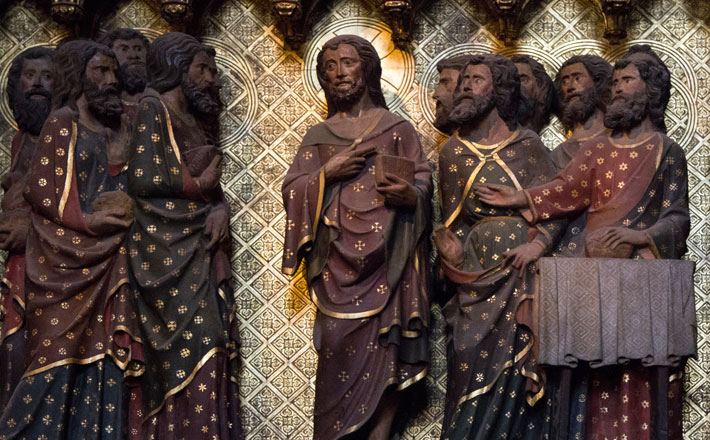Commentary on 1 John 3:1-7
In the overture (John 1:1-51) of the symphonic Fourth Gospel, a clear chord is struck that emphasizes the welcoming and adoption of those who embrace Jesus Christ, Son of God: “But to all who received him, who believed in his name, he gave power to become children of God who were born, not of blood or of the will of the flesh or of the will of man, but of God” (John 1:12-13).
The gracious inclusion of believers-in-Jesus is in contrast here to those who refused and rejected him (John 1:11). Ironically, and tragically, those who turned Jesus away are called (by John) Jesus’ “own people” (John 1:11).
Seven chapters later in the Gospel of John this theme reappears, this time in a conversation between Jesus and some of his disputants. Jesus speaks of freedom for those who follow his teachings. The Jews immediately deny needing freedom and establish their security as progeny of Abraham. Jesus offers to them a startling analogy: “everyone who sins is a slave to sin. Now a slave has no permanent place in the family, but a son belongs to it forever. So if the son sets you free, you are free indeed” (John 8:34-36).
No doubt 1 John draws from the same pool of images, or — to continue a music analogy — plays the song of redemption in the same key. The focus of 1 John 3:1-7 is on adoption and the hospitality of God — See what love the Father has given us, that we should be called children of God; and that is what we are (1 John 3:1)! While many of the background details about why the Elder1 wrote 1 John are lost to history, we have some clues in the text that certain dissenters were trying to lead the Elder’s own community astray (see 1 John 2:26). And perhaps these dissenters were trying to get them to turn their attention away from Jesus and to safeguard their identity in something or someone else, even to the point of forsaking Jesus (see 1 John 2:28). But, as is clear in both the Gospel of John and 1 John, there is no safer place to be than in the family of God, and there is no other way to enter this family than through Christ the Son.
The Elder offers support for why this community might face rejection from others (including the dissenters) — “The reason the world does not know us is that it did not know him” (1 John 3:1b). Where is your attention?, the Elder inquires. Is it constantly looking to the world for legitimation, security, and accolades? Are you just trying to “fit in”? Do you simply want to be like everyone else? Follow their regulations for acceptability? If you do that, you will miss what is happening right in front of you — God is calling out, the God, calling out to you, saying you are Mine. And God says this not as demand unto slavery, but rather the opposite, with overflowing love.
The NRSV translates the “what” of “what love” in 1 John 3:1 based on the Greek word potapen, which has a literally meaning “of what country?” In that sense the Elder is saying — from what foreign country did this strange, amazing love come, that we could be called children of God? Possibly the Elder used potapen in its more generic sense of “what type” or “what kind” — in this case it would mean something like, what type of love is this — what amazing love that calls us children of God? In either case, the Elder shows wonder, joy, and bewilderment that God would treat sinners so graciously. Any one of us with difficult guests or acquaintances will know that it is one thing to tolerate them, something kinder to lend a bit of help. But to actually welcome them into your home and life as family? What sort of love could this be and who is sufficient for these things?
Transformed by adoption
According to the Elder, it is not enough simply to be called a son of God, if there is no real substance behind this (perhaps poking at the empty promises of the dissenters). St. Augustine raises this matter quite poignantly: “For those who are called sons, and are not sons, what profit them the name where the thing is not? How many are called “physicians” but know not how to heal! How many are called “watchers,” but sleep all night long! So, many are called “Christians,” and yet in their deeds are not found to be; because they are not actually what they are called, this is, in life, in hope, in charity” (Homilies IV on the First Epistle of John). Augustine’s point is that the divine adoption of believers-in-Jesus is not simply words — adopted, saved, redeemed. Believers go through a transformative process. We can easily relate the Elder’s language of adoption to Colossians 1:13-14 — “He has rescued us from the dominion of darkness and brought us into the kingdom of the Son he loves, in whom we have redemption, the forgiveness of sins.”
In the Roman world adoptions took place, but it was not about compassion for orphans. In fact, many people were adopted as young adults or adults. Adoption was about inheritance and name. Often a man was adopted to carry on the name of a childless family. The adopted son would sever ties to the old family and this would include relief of any debt owed under the name of the old family. He would become a whole new person, in a new context, with a new inheritance and name.
And so it goes with spiritual adoption through Jesus Christ! The Elder’s vision is not just about the past (a clean slate), or the distant future (going to heaven), but also the present and progress. As the Elder notes, redemption is illusory if it is not transformative unto righteousness. Sin cannot be ignored or redefined as an evasive tactic (perhaps a tactic the dissenters were using). Christ came to deal with sin, and abiding in him, entering into the family of God through Christ’s own Sonship, is the only way to sever the bondage to sin.
Notes:
1 The author of 1 John is conventionally called “the Elder” in scholarship.


April 19, 2015